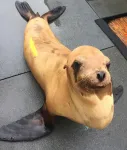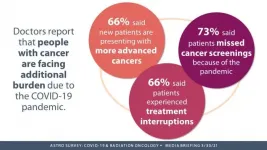(Press-News.org) Sausalito, Calif. (March 30, 2021) - After more than three decades of research, scientists have proven that the cancer affecting up to one in four adult California sea lions necrospied at The Marine Mammal Center in Sausalito, CA, is caused by a sexually transmitted herpesvirus. The cancer, known as sea lion urogenital carcinoma, has clear parallels to cervical cancer in humans and provides a helpful model for human cancer study.
Scientists have long suspected this cancer was associated with a virus, but this is the first study to prove this theory. The study, which was published in Animals, an open-access, peer-reviewed journal, concluded that genital herpesvirus is a driving factor in the development of sea lion urogenital carcinoma. The research also suggests there is an underlying trigger or event that causes the virus to induce cancer in some infected sea lions and not others. Wild California sea lions have among the highest prevalence of a single type of cancer in any mammal, including humans.
A second recently published paper (Sea lions are dying from a mysterious cancer. - Los Angeles Times, latimes.com) led by the same team showed that pollutants such as PCBs and DDT play a significant role as co-factors in the development of this cancer. This is particularly relevant to Southern California where there is a large DDT dumpsite in the Southern California bight which is also where the majority of the sea lion population gather each year to give birth and raise their pups (How the waters off Catalina became a DDT dumping ground - Los Angeles Times, latimes.com).
"The confirmation that this is a virally induced cancer combined with the knowledge that contaminants play a significant role in the cancer's development means that we can use these sea lions as a naturally occurring disease model to better understand how cancer develops and spreads in all species, including humans," says Dr. Alissa Deming, the lead author of the study who completed this work during her Ph.D. studies at University of Florida in Gainesville, FL., while she was a Research Fellow at The Marine Mammal Center in Sausalito, CA. (Dr. Deming is now Director of Clinical Medicine at the Pacific Marine Mammal Center in Laguna Beach, CA.)
The Marine Mammal Center is the world's largest marine mammal hospital and has been on the forefront of researching and understanding cancer in California sea lions and its connection to both ocean and human health. Since cancer in sea lions was first discovered in 1979, researchers have found that between 18-23 percent of adult sea lions admitted to the Center's hospital have died of the fatal disease. In 2010, the Center brought together an array of international researchers to form the Sea Lion Cancer Consortium to further investigate this disease, many of whom helped co-author the paper.
"This research is critical as these sea lions may hold the key to understanding virally induced cancers as well as how cancer metastasizes, or spreads through the body," says Dr. Pádraig Duignan, Director of Pathology at The Marine Mammal Center and a co-author on the study. "This knowledge is an important link that could help scientists better understand various cancers in people."
Most cancers are caused by an accumulation of several factors, making it challenging to study cancer in traditional laboratory models. However, wild sea lions experience multiple layers of stressors including infectious agents, exposure to pollutants, nutrition, and environmental influences, all of which are much more representative of how cancer develops in the "real world."
According to Duignan, "the cancer begins in the sea lion's genital tract and aggressively spreads throughout the sea lion's body, resulting in death, often from kidney failure." Because of the advanced state of cancer by the time these patients strand on beaches and are rescued by rehabilitation centers, euthanasia is the only humane option. "This cancer is devastating to see in California sea lions. They come to the hospital in end-stage disease," says Dr. Deming.
The paper was the result of an international, cross-discipline effort, combining multiple techniques from a variety of specialists to unlock the mysteries of this disease. The research relied on novel techniques using RNAscope® Technology and Base Scope™, tools that allow researchers to pinpoint high viral gene expression within tumor tissue but not in surrounding healthy tissue.
"Our study was the first time that this revolutionary technique has been used on a marine mammal species," says Dr. Kathleen Colegrove, Clinical Professor of the Zoological Pathology Program at the University of Illinois Urbana-Champaign, and a key researcher on the study. "This proved that the virus was integral to cancer development and was not just being detected in the reproductive tracts or tissue as a bystander."
INFORMATION:
Tumor analysis was conducted at the University of Illinois, University of Florida, North Carolina State University and University of St. Andrews in Scotland.
The research work was funded by the Geoffrey C. Hughes Foundation Research Fellowship, the National Institutes of Health and National Science Foundation joint program for the Ecology of Infectious Disease, the National Marine Fisheries Service Marine Mammal Health and Stranding Program, and the Natural Environment Research Council.
ABOUT THE MARINE MAMMAL CENTER:
The Marine Mammal Center is a global leader in marine mammal health, science and conservation, and is the world's largest marine mammal hospital. As a leading contributor to the global body of research and knowledge about marine mammal medicine and ocean health, the Center generates research findings and scientific outputs at volumes comparable to top academic institutions and prides itself on gathering and providing open research data that is free to access, reuse, repurpose and redistribute. The Center's teaching hospital and training programs operate globally with headquarters in Sausalito, CA. The Center has rescued more than 24,000 marine mammals from 600 miles of authorized rescue area along the California coastline and the Big Island of Hawai'i. The Center's mission is to advance global ocean conservation through marine mammal rescue and rehabilitation, scientific research, and education.
For more information, please visit MarineMammalCenter.org. Follow us on Facebook, Instagram and Twitter.
WASHINGTON, March 30, 2021 -- Emerging technologies can screen for cervical cancer better than Pap smears and, if widely used, could save lives both in developing nations and parts of countries, like the United States, where access to health care may be limited.
In Biophysics Reviews, by AIP Publishing, scientists at Massachusetts General Hospital write advances in nanotechnology and computer learning are among the technologies helping develop HPV screening that take the guesswork out of the precancer tests. That could mean better screening in places that lack highly trained doctors and advanced laboratories.
Cervical cancer is the world's fourth-most common cancer, with more than ...
WASHINGTON, March 30, 2021 -- As ethanol, biodiesel, and other biofuels continue to present challenges, such as competing with food security or lacking the technology for more efficient and low-cost production, microalgae are gaining momentum as a biofuel energy crop.
In their paper, published in the Journal of Renewable and Sustainable Energy, by AIP Publishing, Yangzhou University researchers in China show how a combination of monochromatic red and blue LED illumination on one type of microalga can enhance its growth and increase the biosynthesis of critical components, such ...
New observations with the European Southern Observatory's Very Large Telescope (ESO's VLT) indicate that the rogue comet 2I/Borisov, which is only the second and most recently detected interstellar visitor to our Solar System, is one of the most pristine ever observed. Astronomers suspect that the comet most likely never passed close to a star, making it an undisturbed relic of the cloud of gas and dust it formed from.
2I/Borisov was discovered by amateur astronomer Gennady Borisov in August 2019 and was confirmed to have come from beyond the Solar System a few weeks ...
WASHINGTON, March 30, 2021 -- Scientists are developing tools to observe the biological machinery in in vivo animal models to be able to understand and better treat severe brain diseases like Alzheimer's disease and many other conditions. Holographic endoscopes attracted researchers' interest because of their potential to conduct minimally invasive observations inside the human body.
These tools can shed light on the biological processes occurring at the macromolecular and subcellular levels, which usually remain hidden from sight as most tissue is opaque to visible radiation. In APL Photonics, by AIP Publishing, researchers from the Leibniz Institute of Photonic Technology in Germany created a particularly narrow ...
It makes evolutionary sense for long-lived animals to have complex social relationships - such as friends and enemies - researchers say.
Some species and individuals focus their energy on reproduction (live fast, die young), while "slow-living" animals prioritise survival and tend to live longer lives.
In the new paper, University of Exeter scientists argue that natural selection favours complex social structures among slow-living animals - meaning that knowing their friends and enemies is easier for animals with longer lifespans, and helps them live even longer.
Meanwhile, fast-lived species should only bother with such social relationships if it increases ...
What The Study Did: Researchers investigated COVID-19 vaccine intentions among racially and ethnically diverse samples of health workers and the general population in the San Francisco Bay area.
Authors: Kevin Grumbach, M.D., of the San Francisco General Hospital and University of California, San Francisco, is the corresponding author.
To access the embargoed study: Visit our For The Media website at this link https://media.jamanetwork.com/
(doi:10.1001/jamainternmed.2021.1445)
Editor's Note: The article includes conflict of interest and funding/support disclosures. Please see the article for additional ...
ARLINGTON, Va., March 30, 2021 -- Doctors who oversee cancer clinics say that new patients are arriving for treatment with more advanced disease than before the COVID-19 pandemic, according to a new survey from the American Society for Radiation Oncology (ASTRO). The national survey of radiation therapy practice leaders fielded this winter also indicates that treatment postponements and deferrals that were common a year ago have largely subsided and that clinics continue to use a variety of enhanced safety measures to protect their patients and staff.
"One year into the COVID-19 pandemic, we already see the consequences of pandemic-driven drops in cancer screening and diagnostics," said Thomas J. Eichler, MD, FASTRO, ...
Boston - For decades, the power of the placebo effect was thought to lie in patients' belief that they were -- or at least, could be -- receiving a pharmacologically active treatment. A new study by physician-researchers at Beth Israel Deaconess Medical Center (BIDMC) suggests that patients don't need to be deceived to receive benefit from treatment with placebo.
In a randomized clinical trial published in the journal PAIN, researchers found participants with moderate to severe irritable bowel syndrome (IBS) who were knowingly treated with a pharmacologically inactive pill -- referred to as an honest or open-label placebo -- reported clinically meaningful improvements in their IBS symptoms. People who received the open-label placebo experienced improvements ...
LAWRENCE -- Recent incidents of racial discrimination and violence against Asians and Asian-Americans in the United States have prompted critical discussions about how to talk about such biases with younger age groups. New research from the University of Kansas shows using critical race media literacy, or examining how race and gender are addressed in popular culture, can be an effective way to discuss those topics and engage students.
KU researchers published a study in which they observed an American teacher using critical race media literacy to discuss racism and sexism in superhero movies in English as a foreign language classes in a South Korean high school. They argued that successful implementation ...
Through his role on the U.S. Preventive Services Task Force, UVA Health's Li Li, MD, PhD, MPH, has helped develop new lung cancer screening guidelines that expand screenings to more high-risk patients.
The new guidelines are focused on Americans at higher risk because of their history of smoking, which is the leading cause of lung cancer. There are two significant changes in the new guidelines. For those who are still smoking or quit less than 15 years ago, a yearly screening using a low-dose computed tomography (CT) scan is now recommended:
beginning at age 50, instead of age 55.
for anyone who has smoked 20 pack-years in their lifetime, instead of 30 pack-years. A pack-year equals smoking a pack of cigarettes a day for a year.
The ...







